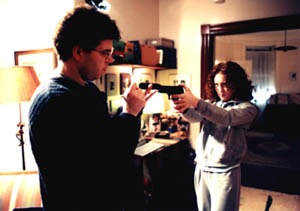
On the Island: A Report from the 2001 Nantucket Film Festival
Written by Kat Thomas | Posted by: Anonymous
Now in its sixth year, the Nantucket Film Festival, which was held June 20-24, has become a staple to any serious member of the film community. This year’s festival included the screening of 21 features and 23 shorts, along with numerous other activities including: staged readings, panel discussions, "Morning Coffee," and numerous parties. It is a film festival that prides itself on honoring the screenwriter claiming that here is where "screenwriters inherit the Earth."
This year’s Nantucket Film Festival showcased four New England films: "Unfinished Symphony," "Dinner and a Movie," "Orphan," and "The Gentleman from Boston." All of these films were well received, with the latter three having sold out screenings. One of New England’s crowning achievements of this year’s festival was a special sneak screening of Brad Anderson’s horror film "Session 9." This movie, shot last fall in Danvers, Massachusetts, was the only New England film at the festival to have distribution. The highlight of the film is the talent of cinematographer Uta Briesewitz who was able to capture the disquietude horror of the Danvers State Hospital.
Since the Nantucket Film Festival focuses on writing, there were numerous venues where screenwriting was explored, including a series of hour long gatherings called "Morning Coffee." Hosted on different days by people such as Jonathan Burkhart, Executive Festival Director; actor and director Jonathan Shea; and Bingham Ray, founder of October Films, this hour allowed people interested in screenwriting to understand the work that goes into the process, from script to screen. What made these "Morning Coffee" hours beneficial was that there was a feeling of camaraderie as audience members were encouraged to meet and great the participants of each morning’s program. One of the most fascinating "Morning Coffee" hours included the innovative Arthur Penn, director of "Bonnie and Clyde," and Walter Bernstein, screenwriter of such classic films as the "Molly MacGuires" and "The Front." The meeting of these two great minds was something that most festival viewers will not forget for a long time.
Bernstein was honored at this year’s NBC Writer’s Tribute. Bernstein was blacklisted in the early 1950’s and was unable to return to film writing for nearly a decade. He then proceeded to write such classic scripts as "Heller in Pink Tights," "The Money Trap," "Paris Blues," and "Miss Evers’ Boys." His blacklisting experience became the basis for his most poignant, notable work "The Front," starring Woody Allen, for which he was nominated for the Academy Award for Best Screenplay.
Bernstein also made an appearance at a panel discussion titled "Creative Collaboration in Filmmaking?" Moderated by filmmaking legend John Pierson, writer of the best-selling book "Spike, Mike, Slackers & Dykes," this panel contained Stephen Schiff, screenwriter of "Lolita" and Tom Perrotta writer of "Election." During this discussion, the audience was truly privy to the world of screenwriter. The panel’s audience was constantly reminded that a film is a collaborative art form, and thus one must understand the meaning of the word "compromise" if one is to ever get their work to the screen. When asked when was the first time that Bernstein was ever in a compromising position in terms of writing he replied jokingly, "My Bar Mitzvah when I was 12 years old."
There were two other panels at this year’s festival: "The Limitations of Digital Filmmaking," and "The Changing Face of Distribution." Throughout both, there were numerous discussions on the subject of screenwriting, and how new technologies have altered the existing notions of screenwriting. Interestingly enough, there was barely a mention of the highly publicized, recently averted strike of the Writers Guild of America. Most of the population outside the film community, and truthfully some of the population in the film community, had little knowledge on the true reasoning behind this possible strike. It would have been fitting for a festival that highlights screenwriting to have focused a panel discussion on the issues and resolution of this subject.
There have been whispered rumors of the possibility that this may be that last year of the Nantucket Film Festival. As the number of New England film festivals explodes, with gossip of a Martha Vineyard festival in 2002, one might question if it would be noticeable if this festival just faded away. Well it would. The Nantucket Film Festival is an asset to the New England film community. Although there are some flaws (for example there was no short film from New England), Nantucket is a festival that gives New England clout with the New York film community. Whenever discussions of the New England film community are broached, those outside the community are quick to question its value with New York City being so close by; yet there exists at this festival enough influence that many players from New York travel to the island of Nantucket.
And let’s not forget the possibilities for distribution. Many major independent distribution companies were present at this year’s festival including Showtime, Fine Line Features, and IFP Distribution. No other film festival in New England can offer that claim. This does not mean that the Nantucket Film Festival is comparable to Toronto or Sundance, but there were things happening on this island; deals were being made.
For more information on the festival visit http://www.nantucketfilmfestival.org or email ackfest@aol.com.










